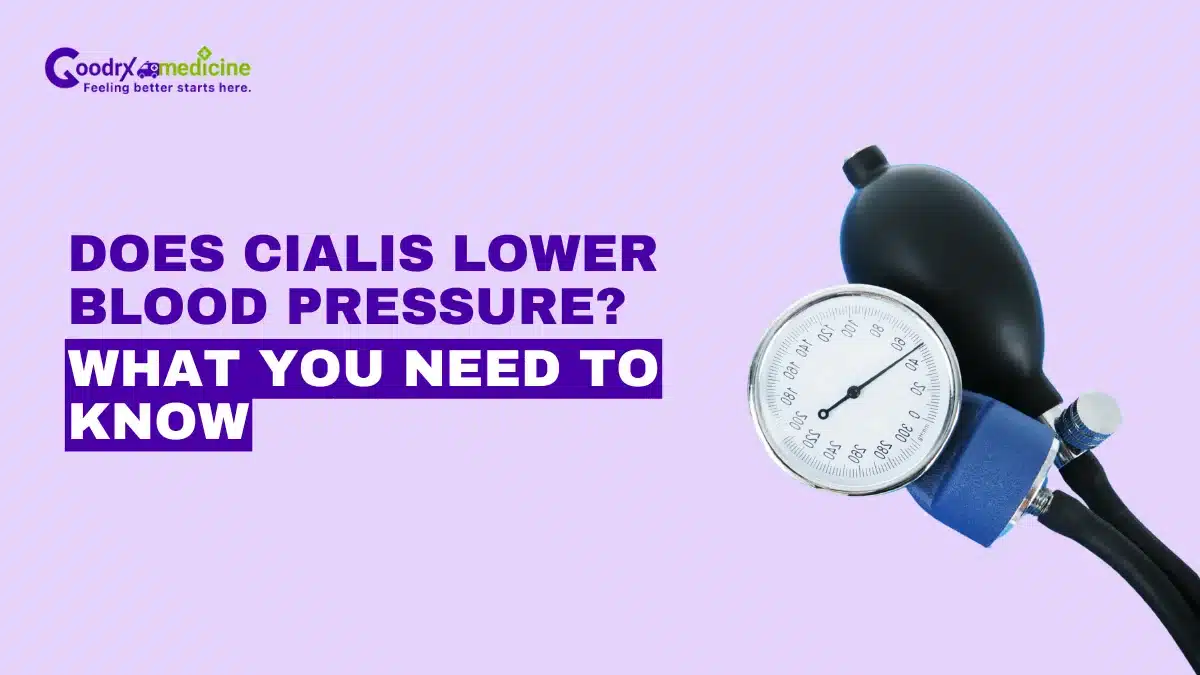Cialis, a well-known medication for Erectile Dysfunction (ED), has an interesting effect on the body, it can slightly lower your blood pressure. This happens because Cialis relaxes and widens blood vessels, helping the blood to flow easily.
While this may sound beneficial, it is important to know that Cialis is not a treatment for High Blood Pressure and should only be taken if prescribed by a doctor.
In this article, you will get the detailed answer to: Does Cialis lower blood pressure and why you should use it cautiously if you have heart or blood pressure issues.
Does Cialis lower blood pressure?
Yes, Cialis can lower blood pressure. It widens the blood vessels which allows blood to flow more freely. This action can cause a mild, temporary drop in blood pressure, especially in healthy individuals.
However, while this effect might seem helpful, Cialis is not meant to be used as a treatment for High Blood Pressure. Always use it under medical supervision, especially if you’re taking medications for blood pressure or have heart-related conditions.
How does Cialis work?
Cialis is the brand name for Tadalafil, a medicine that belongs to Phosphodiesterase type 5 or PDE5 inhibitors group of medicines. These medicines work by blocking an enzyme called PDE5.
This enzyme normally reduces blood flow by tightening blood vessels.
By blocking PDE5, Cialis helps relax blood vessels, improving circulation, especially in the penis. That’s how it helps men with Erectile Dysfunction.
But because it affects blood vessels throughout the body, it can also have an impact on your overall blood pressure.
How does Cialis lower blood pressure?
Tadalafil (Cialis) causes vasodilation, which means it relaxes and widens your blood vessels. When blood vessels are more open, blood flows more easily, and this naturally causes a drop in blood pressure.
A study published in the British Journal of Clinical Pharmacology in 2006 found out that Hypertension patients who took 20 mg of Tadalafil experienced lower blood pressure by 4.8 mmHg.
Can I take Cialis for High Blood Pressure?
No, Cialis is not prescribed to treat High Blood Pressure or Hypertension, even though it may cause a slight drop in it. The blood pressure-lowering effect is not strong or consistent enough to make it a safe or effective treatment for hypertension.
However, Tadalafil is approved under the name Adcirca for treating Pulmonary Arterial Hypertension (PAH), a specific kind of High Blood Pressure that affects the lungs. This is not the same as general High Blood Pressure.
Conclusion
So, does Cialis lower your blood pressure? The answer is yes, Cialis (Tadalafil) can slightly lower your blood pressure due to its blood vessel-relaxing effects. While this may seem like a bonus benefit, it’s important to remember that Cialis is not a treatment for general High Blood Pressure.
Its impact on blood pressure is mild and temporary, and using it without medical guidance, especially if you have heart problems or take blood pressure medications, can be risky.
Always consult your doctor before using Cialis, and never substitute it for actual blood pressure medications. Use it only for its intended purpose: treating Erectile Dysfunction, unless specifically prescribed otherwise.
Frequently Asked Questions
What does Cialis do to your heart?
Cialis increases blood flow throughout the body, including to the heart and lungs. In people with certain heart conditions, this might help. But in others, it could be risky—especially when combined with medications like nitrates, which also lower blood pressure. Never mix Cialis with heart medications without consulting your doctor.
Is it safe to take Cialis with blood pressure medication?
No, taking Cialis with blood pressure medication can increase the risk of low blood pressure. This combination may cause dizziness, fainting, or a rapid heartbeat. Your doctor may change your dose or monitor you more closely. Never mix medications without professional medical advice.
Can Cialis cause dizziness or lightheadedness?
Yes, some users report dizziness or lightheadedness, especially when standing up quickly. This happens due to the blood pressure-lowering effect. If these symptoms are severe or persistent, stop taking the medicine and visit your doctor. Stay hydrated and avoid sudden movements after taking Cialis.
Should I avoid alcohol while taking Cialis?
Yes, alcohol can increase the blood pressure-lowering effect of Cialis, leading to dizziness or fainting. Limit or avoid alcohol while using the drug to reduce risks. Combining both may also reduce Cialis’s effectiveness in treating Erectile Dysfunction.
When referencing outside resources, GoodrxMedicine always provides full citations. To learn more about the measures we use to maintain the quality of our content, please review our Content Information Policy.















